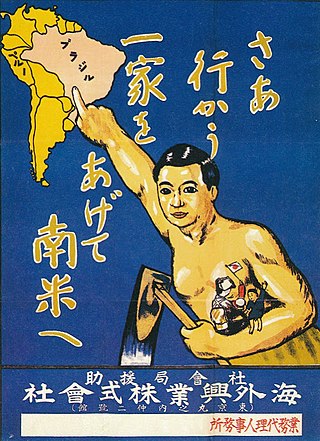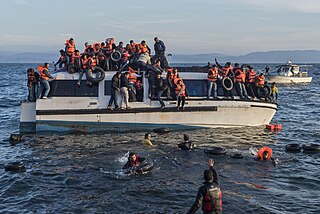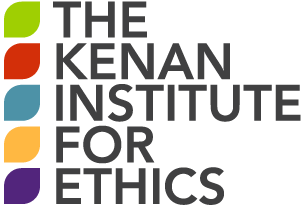
The International Organization for Migration (IOM) is a United Nations agency that provides services and advice concerning migration to governments and migrants, including internally displaced persons, refugees, and migrant workers.

A refugee, conventionally speaking, is a person who has lost the protection of his or her country of origin and who cannot or is unwilling to return there due to well-founded fear of persecution. Such a person may be called an asylum seeker until granted refugee status by the contracting state or the United Nations High Commissioner for Refugees (UNHCR) if they formally make a claim for asylum.

Emigration is the act of leaving a resident country or place of residence with the intent to settle elsewhere. Conversely, immigration describes the movement of people into one country from another. A migrant emigrates from their old country, and immigrates to their new country. Thus, both emigration and immigration describe migration, but from different countries' perspectives.

Human migration is the movement of people from one place to another with intentions of settling, permanently or temporarily, at a new location. The movement often occurs over long distances and from one country to another, but internal migration is also possible; indeed, this is the dominant form of human migration globally. Migration is often associated with better human capital at both individual and household level, and with better access to migration networks, facilitating a possible second move. It has a high potential to improve human development, and some studies confirm that migration is the most direct route out of poverty.Age is also important for both work and non-work migration. People may migrate as individuals, in family units or in large groups. There are four major forms of migration: invasion, conquest, colonization and emigration/immigration.

Forced displacement is an involuntary or coerced movement of a person or people away from their home or home region. The UNHCR defines 'forced displacement' as follows: displaced "as a result of persecution, conflict, generalized violence or human rights violations".

Environmental migrants are people who are forced to leave their home region due to sudden or long-term changes to their local or regional environment. These changes compromise their well-being or livelihood, and include increased drought, desertification, sea level rise, and disruption of seasonal weather patterns. Though there is no uniform, clear-cut definition of environmental migration, the idea is gaining attention as policy-makers and environmental and social scientists attempt to conceptualize the potential social effects of climate change and other environmental degradation, such a deforestation or overexploitation.

Immigration is the international movement of people to a destination country of which they are not natives or where they do not possess citizenship in order to settle as permanent residents or naturalized citizens. Commuters, tourists, and other short-term stays in a destination country do not fall under the definition of immigration or migration; seasonal labour immigration is sometimes included, however.
Social integration is the process during which newcomers or minorities are incorporated into the social structure of the host society.
World Refugee Day is an international day organised every year on 20 June by the United Nations. It is designed to celebrate and honour refugees from around the world. The day was first established on 20 June 2001, in recognition of the 50th anniversary of the 1951 Convention Relating to the Status of Refugees.
International migration occurs when people cross state boundaries and stay in the host state for some minimum length of the time. Migration occurs for many reasons. Many people leave their home countries in order to look for economic opportunities in another country. Others migrate to be with family members who have migrated or because of political conditions in their countries. Education is another reason for international migration, as students pursue their studies abroad, although this migration is often temporary, with a return to the home country after the studies are completed.
The Refugee Studies Centre (RSC) was established in 1982, as part of the University of Oxford's Department of International Development, in order to promote the understanding of the causes and consequences of forced migration and to improve the lives of some of the world's most marginalised people. Its philosophy is to "combine world-class academic research with a commitment to improving the lives and situations for some of the world's most disadvantaged people".

The Kenan Institute for Ethics at Duke University is an interdisciplinary "think and do" tank committed to understanding and addressing real-world ethical challenges facing individuals, organizations and societies worldwide. The Institute promotes ethical reflection and engagement through its research, education and practice in five core areas: Human Rights, Global Migration, Rethinking Regulation, Moral Attitudes and Decision-Making, and Religions and Public Life.
Migration studies is the academic study of human migration. Migration studies is an interdisciplinary field which draws on anthropology, prehistory, history, economics, law, sociology and postcolonial studies.

Alexander Betts is Professor of Forced Migration and International Affairs, William Golding Senior Fellow in Politics at Brasenose College, and Associate Head of the Social Sciences Division at the University of Oxford.
Gerard-René de Groot is a Professor emeritus of Maastricht University in Comparative Law and Private International Law. He studied law at University of Groningen and at the Westfälische Wilhelmsuniversität Münster (Germany). De Groot obtained the degrees Magister iuris and Doctorandus iuris at Groningen University and taught there 1974–1982. He also obtained the degree of Doctor iuris at Maastricht University. In 1982 de Groot started to teach at Maastricht University and was subsequently appointed as a professor. Since 2007 he has taught at the University of Aruba.

Melissa Siegel is an American academic specialising in migration. She is professor of migration studies at the Maastricht Graduate School of Governance and UNU-MERIT where she has also been head of the migration and development research section since 2010.
Jane Alexandra McAdam is an Australian legal scholar, and expert in climate change and refugees. She is a Scientia Professor at the University of NSW, and is the inaugural Director of the Kaldor Centre for International Refugee Law. She is a Fellow of the Academy of Social Sciences. She was awarded an Order of Australia in 2021 for “distinguished service to international refugee law, particularly to climate change”.

The Global Refugee-Led Network (GRN), previously known as the Network for Refugee Voices, is an international not for profit organization that organizes advocacy between local and national refugee organizations.
Muzna Dureid is a Syrian human rights activist and former refugee, based in Montreal, Canada.
The Refugee Education Council is a Government of Canada advisory body that works to include the voices of refugees in refugee-education programs.











